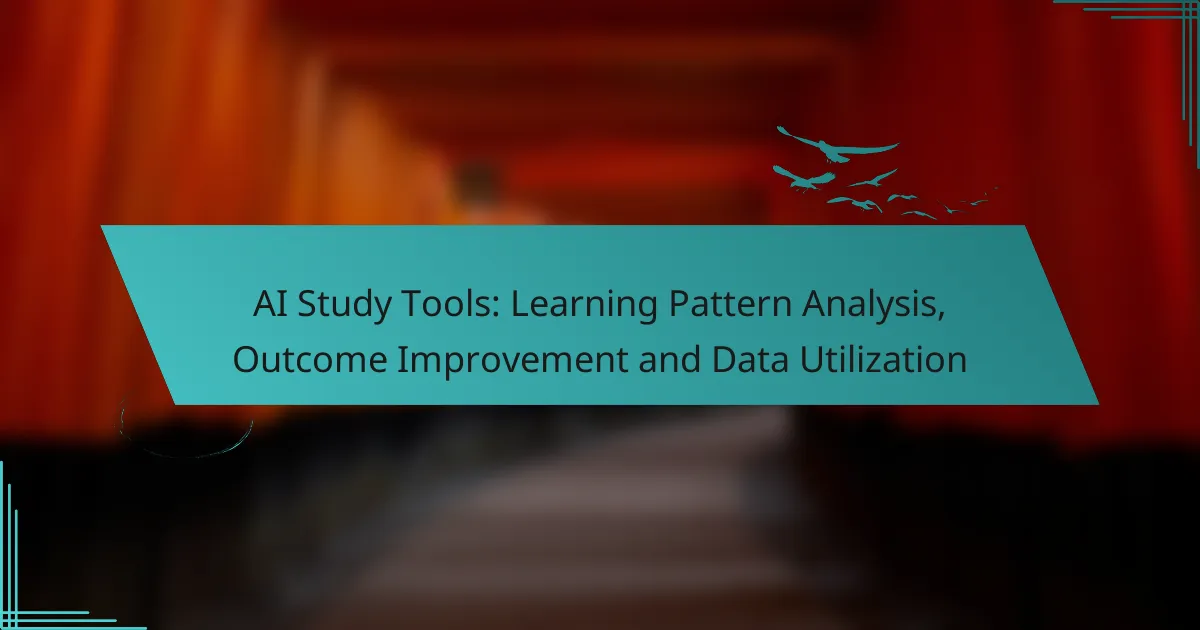AI study tools are revolutionizing education by analyzing individual learning patterns and providing customized resources to enhance outcomes. By leveraging data, these tools identify strengths and weaknesses, enabling targeted improvements in educational performance and optimizing study habits for better results.

How Can AI Study Tools Improve Learning Outcomes?
AI study tools enhance learning outcomes by analyzing individual learning patterns and providing tailored resources. These tools leverage data to identify strengths and weaknesses, allowing for targeted improvements in educational performance.
Personalized learning experiences
Personalized learning experiences are designed to meet the unique needs of each student. AI tools assess individual learning styles, preferences, and progress, enabling the creation of customized study plans that focus on areas needing improvement.
For instance, a student struggling with math might receive additional practice problems and video tutorials specifically targeting their weak points. This tailored approach can significantly boost engagement and retention of information.
Data-driven feedback mechanisms
Data-driven feedback mechanisms provide real-time insights into a student’s performance. AI tools analyze responses and learning behaviors, offering immediate feedback that helps learners understand their mistakes and correct them promptly.
For example, an AI study tool might highlight patterns in incorrect answers, allowing educators to adjust teaching strategies or provide additional resources. This continuous feedback loop fosters a more effective learning environment.
Adaptive learning pathways
Adaptive learning pathways adjust the curriculum based on a student’s evolving needs and performance. AI systems monitor progress and modify the difficulty of tasks, ensuring that learners are consistently challenged without becoming overwhelmed.
As students master certain concepts, the AI can introduce more complex material, keeping them engaged and motivated. This dynamic approach helps maintain a steady pace of learning, catering to both advanced and struggling students effectively.

What Are the Key Features of AI Study Tools?
AI study tools are designed to enhance learning by analyzing user behavior, tracking outcomes, and integrating with existing educational platforms. These features help learners optimize their study habits and improve overall performance.
Learning pattern analysis
Learning pattern analysis involves examining how students engage with study materials to identify effective strategies and areas needing improvement. AI tools can track metrics such as time spent on tasks, types of resources used, and quiz performance to create a comprehensive profile of a learner’s habits.
By recognizing trends in learning, these tools can provide personalized recommendations, such as suggesting specific topics to review or adjusting the difficulty of practice questions. For instance, if a student consistently struggles with math problems, the tool may recommend additional resources or practice sessions focused on that area.
Outcome tracking and reporting
Outcome tracking and reporting allow students and educators to monitor progress over time. AI study tools can generate reports that highlight improvements in grades, completion rates, and engagement levels, providing valuable insights into learning effectiveness.
These reports can be customized to show specific metrics, such as the percentage increase in test scores or the average time taken to complete assignments. Regularly reviewing these outcomes helps learners stay motivated and adjust their study strategies as needed.
Integration with existing platforms
Integration with existing platforms is crucial for seamless user experience. AI study tools often connect with popular learning management systems (LMS) and educational apps, allowing for easy data sharing and enhanced functionality.
For example, a student using a well-known LMS can access AI-driven insights directly within the platform, eliminating the need to switch between multiple applications. This integration not only saves time but also ensures that all learning data is centralized, making it easier to track progress and outcomes.

Which AI Study Tools Are Most Effective?
The most effective AI study tools leverage data analysis to enhance learning patterns and improve outcomes. These tools, such as Quizlet, Khan Academy, and Coursera, utilize adaptive learning technologies to personalize education and track progress efficiently.
Quizlet
Quizlet is a widely used study tool that employs flashcards and interactive learning methods to help students memorize information. It uses AI to analyze user performance and adapt study sessions accordingly, focusing on areas where learners struggle the most.
With features like Quizlet Learn, users can engage in personalized study paths that adjust based on their progress. This adaptability can lead to improved retention rates, making it a practical choice for students preparing for exams or mastering new concepts.
Khan Academy
Khan Academy offers a comprehensive range of educational resources, including instructional videos and practice exercises, all tailored to individual learning needs. Its AI-driven system assesses user performance and recommends specific content to address knowledge gaps.
This tool is particularly beneficial for students in the U.S., as it aligns with common core standards, providing a structured learning experience. Users can track their progress over time, ensuring they stay on target with their educational goals.
Coursera
Coursera partners with universities and organizations to provide access to a variety of courses, many of which incorporate AI for personalized learning experiences. The platform analyzes user engagement and performance to suggest relevant courses and materials, enhancing the learning journey.
With options for professional development and academic credit, Coursera caters to a diverse audience, from high school students to working professionals. Its flexible learning schedules and diverse subject offerings make it a valuable resource for anyone looking to improve their skills or knowledge base.

How Do AI Study Tools Utilize Data?
AI study tools leverage data to enhance learning experiences by analyzing performance metrics, identifying gaps in knowledge, and predicting future learning outcomes. This data-driven approach enables personalized education tailored to individual student needs.
Analyzing student performance
AI study tools analyze student performance by collecting data on test scores, assignment completion rates, and engagement levels. This information helps educators understand how well students grasp concepts and where they excel or struggle.
For instance, a tool might track a student’s progress over time, revealing patterns such as consistent difficulties in specific subjects. This allows for timely interventions, ensuring that students receive the support they need to improve.
Identifying knowledge gaps
Identifying knowledge gaps is crucial for effective learning. AI study tools can pinpoint areas where students lack understanding by comparing their performance against benchmarks or peer averages.
For example, if a student consistently scores lower in math than in other subjects, the tool can suggest targeted resources or exercises to address these weaknesses. This tailored approach helps students focus their efforts on areas that will yield the most improvement.
Predictive analytics for future learning
Predictive analytics in AI study tools forecasts future learning outcomes based on historical data. By analyzing trends in a student’s performance, these tools can predict potential challenges and successes in upcoming courses or topics.
For example, if a student shows a steady decline in engagement, the tool may alert educators to intervene before performance drops significantly. This proactive approach can lead to better educational outcomes and more effective learning strategies.

What Criteria Should You Consider When Choosing AI Study Tools?
When selecting AI study tools, focus on user interface, cost, and available support. These factors significantly impact usability, budget, and the effectiveness of the learning experience.
User interface and experience
The user interface (UI) and overall experience are crucial for effective learning with AI study tools. A clean, intuitive design enhances engagement and reduces frustration, allowing users to focus on content rather than navigation. Look for tools that offer customizable layouts and easy access to features.
Consider tools that provide interactive elements, such as quizzes or flashcards, which can enhance retention. User reviews and trial versions can help assess whether the interface suits your learning style.
Cost and subscription models
Cost is a significant factor when choosing AI study tools, as prices can vary widely. Many platforms offer subscription models, ranging from monthly payments to annual plans, with some providing free basic versions. Evaluate what features are included at different price points to ensure you get value for your investment.
Be wary of hidden fees or costs for additional features. It’s often beneficial to start with a free trial to gauge the tool’s effectiveness before committing to a paid plan.
Support and resources availability
Access to support and learning resources can greatly influence your experience with AI study tools. Check if the platform offers customer support through chat, email, or phone, and consider the availability of tutorials, forums, or community support. Comprehensive resources can help you troubleshoot issues and maximize the tool’s potential.
Look for platforms that provide regular updates and additional learning materials, such as webinars or articles. This ongoing support can enhance your learning journey and ensure you stay informed about new features and best practices.

How Do Learning Patterns Impact Study Tool Effectiveness?
Learning patterns significantly influence the effectiveness of study tools by tailoring the educational experience to individual preferences. Understanding these patterns allows for enhanced engagement and retention, leading to improved academic outcomes.
Understanding individual learning styles
Individual learning styles refer to the unique ways in which people absorb, process, and retain information. Common styles include visual, auditory, and kinesthetic learning, each requiring different approaches to maximize effectiveness. For instance, visual learners benefit from diagrams and charts, while auditory learners thrive with lectures and discussions.
Recognizing these styles can help educators and developers create more effective study tools. A simple assessment can identify a learner’s style, enabling the customization of resources that align with their preferences, thus enhancing their overall learning experience.
Adapting content delivery
Adapting content delivery means modifying how information is presented based on identified learning patterns. This can involve using multimedia resources, interactive elements, or varied pacing to cater to different learners. For example, incorporating videos for visual learners or podcasts for auditory learners can significantly improve engagement.
Effective adaptation also includes providing options for learners to choose their preferred format. Tools that allow users to switch between text, audio, and video can cater to diverse needs and preferences, promoting a more personalized learning journey. Regular feedback and assessments can further refine these adaptations, ensuring continuous improvement in study tool effectiveness.
